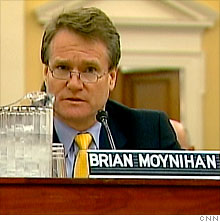 Private label residential mortgage backed securities (RMBS) investors, including BlackRock, PIMCO, and the New York Fed, are expected to join MetLife, Inc. in its efforts to force BofA to repurchase defective subprime and Alt-A mortgage loans originated by Countrywide and backing the group’s investments, Bloomberg reports. The group, led by Houston lawyer Kathy Patrick (see bio and promotional video here) and the law firm of Gibbs & Bruns, has stated in a letter to Bank of America and Bank of New York, the trustee in these securitizations, that it wants to be compensated for losses relating to inadequate servicing on certain loans and to have loans that failed to meet contractual reps and warranties repurchased by the originator. The group holds approximately 25% of the voting rights in $47 billion of Countrywide RMBS in approximately 115 separately identified deals, according to a press release issued by the firm. The Wall Street Journal reports that the group’s holdings total $16.5 billion.
Private label residential mortgage backed securities (RMBS) investors, including BlackRock, PIMCO, and the New York Fed, are expected to join MetLife, Inc. in its efforts to force BofA to repurchase defective subprime and Alt-A mortgage loans originated by Countrywide and backing the group’s investments, Bloomberg reports. The group, led by Houston lawyer Kathy Patrick (see bio and promotional video here) and the law firm of Gibbs & Bruns, has stated in a letter to Bank of America and Bank of New York, the trustee in these securitizations, that it wants to be compensated for losses relating to inadequate servicing on certain loans and to have loans that failed to meet contractual reps and warranties repurchased by the originator. The group holds approximately 25% of the voting rights in $47 billion of Countrywide RMBS in approximately 115 separately identified deals, according to a press release issued by the firm. The Wall Street Journal reports that the group’s holdings total $16.5 billion.
By the close of trading today, BAC’s stock had slid to 11.80 (-4.38%) based on this news and the release of the company’s third quarter earnings report, in which it stated that it could not determine the potential size of its losses from private label putbacks and mortgage and bond insurer rescissions. Still, BofA CEO Brian Moynihan vowed to “defend our shareholders” by disputed demands that it repurchase non-agency mortgages.
While Kathy Patrick’s group is much smaller than the Investor Syndicate represented by Talcott Franklin (which is reported to have amassed over $500 billion of RMBS), Patrick’s group has done what the Syndicate has not yet been able to do – convince its members to move forward with concerted action demanding that the trustee and the originator of the loans backing its investments take action. According to Patrick, ““We now are in a position where we have to start a clock ticking.”
What Patrick is referring to is that her October 18 letter, termed a “Notice of Non-Performance,” is expected to trigger a 60-day waiting period within which both the originator and trustee must act to remedy the breaches identified by the group. While Countrywide/BofA will likely be asked to shoulder the financial responsibility for these alleged breaches, the letter urges Bank of New York, as trustee, to enforce Countrywide’s servicing obligations including the obligation to maintain accurate loan records, demand repurchase of loans failing to comply with underwriting guidelines, and compel the sellers of ineligible loans to bear the costs of modifying or repurchasing them. Patrick further states that if these problems are not resolved within 60 days, they will trigger an Event of Default, which would allow the investors to file a lawsuit against both companies. Patrick was careful to note that, investors “aren’t trying to halt loan modifications for troubled borrowers.”
This latest effort from Patrick and her firm appears to be larger and more well-conceived than her prior effort (discussed previously on The Subprime Shakeout), in which she was stonewalled by Bank of New York for failing to comply with the procedural preconditions to trustee action. Instead of proceeding under a provision seeking an investigation by the Trustee that required proof of 25% of the voting rights in each tranch, which Patrick’s investors did not have, Patrick is now proceeding under Section 7.01 of the pooling and servicing agreement (PSA), relating to the remedies for identified breaches, which requires 25% of the voting rights of the entire pool.
Nevertheless, these efforts may well fail for an additional reason that was cited as a basis for Bank of New York’s refusal to comply with Patrick’s earlier request – the failure to provide evidence of a specific breach. Though Patrick’s letter is reported to identify several provisions of the relevant PSAs that it alleges were violated, it’s unclear what, if any, specific evidence Patrick has provided that would induce the trustee to act. A Bank of New York spokesman has already indicated that the trustee will not act in response to this letter, stating, “[The letter] appears to be directed to Countrywide and does not ask BNY Mellon to take any action. We will continue to perform our duties as trustee.”
Aside from size, the advantage of the Investor Syndicate over groups such as Patrick’s is that it is reported to have analytic methods for identifying and providing specific evidence of servicer breaches, allowing it to overcome this procedural hurdle. However, the longer this group sits on the sidelines, the more losses will accumulate for investors, and the less relevant the Syndicate will become. Perhaps this is why some of the investors, such as BlackRock and PIMCO, that were previously identified as members of Franklin’s group, are now reported to be considering joining Patrick’s group. The Syndicate may want to begin taking action before it loses more investors to its competitors.


